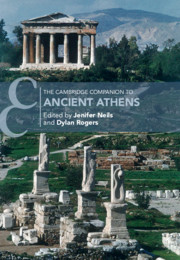Book contents
- The Cambridge Companion to Ancient Athens
- Cambridge Companions to the Ancient World
- The Cambridge Companion to Ancient Athens
- Copyright page
- Contents
- Contributors
- Abbreviations
- Athens: An Introduction
- 1 #Leagros: An Athenian Life
- Part I The Urban Fabric
- Part II Inhabitants
- Part III Business/Commerce
- Part IV Culture and Sport
- Part V Politics
- Reception
- Index
- References
Athens: An Introduction
Published online by Cambridge University Press: 10 March 2021
- The Cambridge Companion to Ancient Athens
- Cambridge Companions to the Ancient World
- The Cambridge Companion to Ancient Athens
- Copyright page
- Contents
- Contributors
- Abbreviations
- Athens: An Introduction
- 1 #Leagros: An Athenian Life
- Part I The Urban Fabric
- Part II Inhabitants
- Part III Business/Commerce
- Part IV Culture and Sport
- Part V Politics
- Reception
- Index
- References
Summary
Inhabited from the Stone Age to the present, Athens is one of the oldest continuously inhabited cities in the world. We know it best from the Classical period (500–300 bc), because in addition to its impressive archaeological remains, such as the Parthenon, a vast variety of informative inscriptions and texts, from philosophical dialogues to comic jokes, attests to its importance. The names of its most famous citizens – Aischylos, Aristophanes, Perikles, Plato, Sokrates, Solon, Themistokles, Thucydides – are not unfamiliar to the educated public. Long after Pindar (fr. 76), Athens remained well known in European history as the “bulwark of Greece,” having routed the Persian menace not only once at Marathon, but also a second time at Salamis. Many of the institutions invented by the Athenians – democracy and theater being the obvious ones, but also practices such as jury pay, impeachment, and a ‘tomb for the unknown soldier’ – are still with us today.
- Type
- Chapter
- Information
- The Cambridge Companion to Ancient Athens , pp. 1 - 6Publisher: Cambridge University PressPrint publication year: 2021
References
Further Reading
Histories of Athens dealing with specific periods are: Anderson 2003 for the Early Classical period and the emergence of democracy; Meier 1998, Munn 2000, and Samons 2007 for the Classical period; and Habicht 1997 for the Hellenistic and Roman periods. An overview of the major monuments in their historical context can be found in Camp 2001 and Goette 2001. Topographical studies include Travlos 1971 and Greco 2010–2015 (with more to come). A thorough study of the Akropolis monuments is Hurwit 1999. For religion in ancient Athens see Parker 1996. The institution of slavery is thoroughly explored by Wrenhaven 2012 and Lewis 2018.

